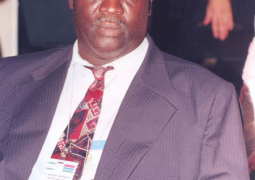
Mr Touray spoke at a graduation ceremony for 16 youths certified for concluding a year-long training session on bird watching, tourist guides and protected area management skills and techniques led by experts in various subject areas.
This was under a programme introduced by the Department of Parks and Wildlife Management.
According to him, for the past twelve months these experts have taken their time to prepare them, by teaching them all that they needed to know in these areas to ensure that a well groomed and moulded young people, who are determined to improve ecotourism and promote sustainable tourism, while creating job opportunities for young people.
“For the past months you were prepared, both theoretical and practically, to overcome any challenges that might lie ahead of you,” said Mr Touray.
He added that the training course was just the beginning of a long journey in the work of conservation and biodiversity protection in The Gambia.
He told the graduates they would be confronted with a lot of new things that might not been covered by the training syllabus, but they should ensure to apply all the skills learned systematically to amicably address the problem.
Mr Touray thanked all who were involved in the coordination and supervision of the training activity for the past twelve months.
Kawsu Jammeh, environmental education officer, who doubles as national focal point and manager of Programme on Work on Protected Area (POWPA) under the Department of Parks and Wildlife Management, spoke at length on the importance of bird watching.
He said the most important biodiversity in The Gambia is birds, and biodiversity is everybody’s business; and that was why it was important to train and capacitise young people on the pros and cons of protected area management and responsible tourist guiding.
He said: “Today you are graduating from an intensive twelve months training course on not only as professional tourist guides and bird watchers, but also as conservationists to ensure environmental protection and conservation are safeguarded in your lines of work as tour guides and bird watchers in The Gambia.”
Mr Jammeh further stated that some of the key issues embedded in their training course included identification of bird species, guiding skills and biodiversity protection skills.
Highlighting the background of conservation in The Gambia, Jammeh point out that it all began in 1916 when The Gambia recognized conservation of biodiversity as an agricultural policy, then forestry and then wildlife were feed into the Agriculture department. Later on forestry became a department, and wildlife was a whole unit under the department.
According to him, in the late 1960s, forestry department recognized the need to have Abuko as a protected area, because of its riches in wildlife and its potentials to attract tourist; thus accrued income for the government of The Gambia.
Since then Abuko has been contributing immensely to the tourism sector in The Gambia, he said.
In 1977, the president of the First Republic made a declaration and a policy statement showing everyone in The Gambia that the country’s biodiversity was disappearing, and this included both the flora and fauna.
“You would agree with me that today we don’t have the big five in the country - elephants, rhinos, lions and buffalos - they were here before, but where are they today?”
There was a culture, with people called a hero if they are able to kill a lion or elephant, which had dwindled the country’s biodiversity, he further stated.
He called the graduating batch to be patriotic. Gambians must be prepared to take the task by pulling the bull by the horns for sustainable development, he said.
Giving the vote of thanks, Ismaila Colley on behalf of the graduates said the day was one of the most important in the history of the department.
“As graduates, we pledge to conserve and preserve what remains of The Gambia’s biodiversity, and I wish to encourage greater awareness creation and public participation of each and every Gambian,” Colley stated.
He re-affirmed their loyalty to the department and the government, and pledged their readiness to work to ensure that biodiversity is conserved.
The ceremony was moderated by Abdoulie Sawo, the training coordinator.



